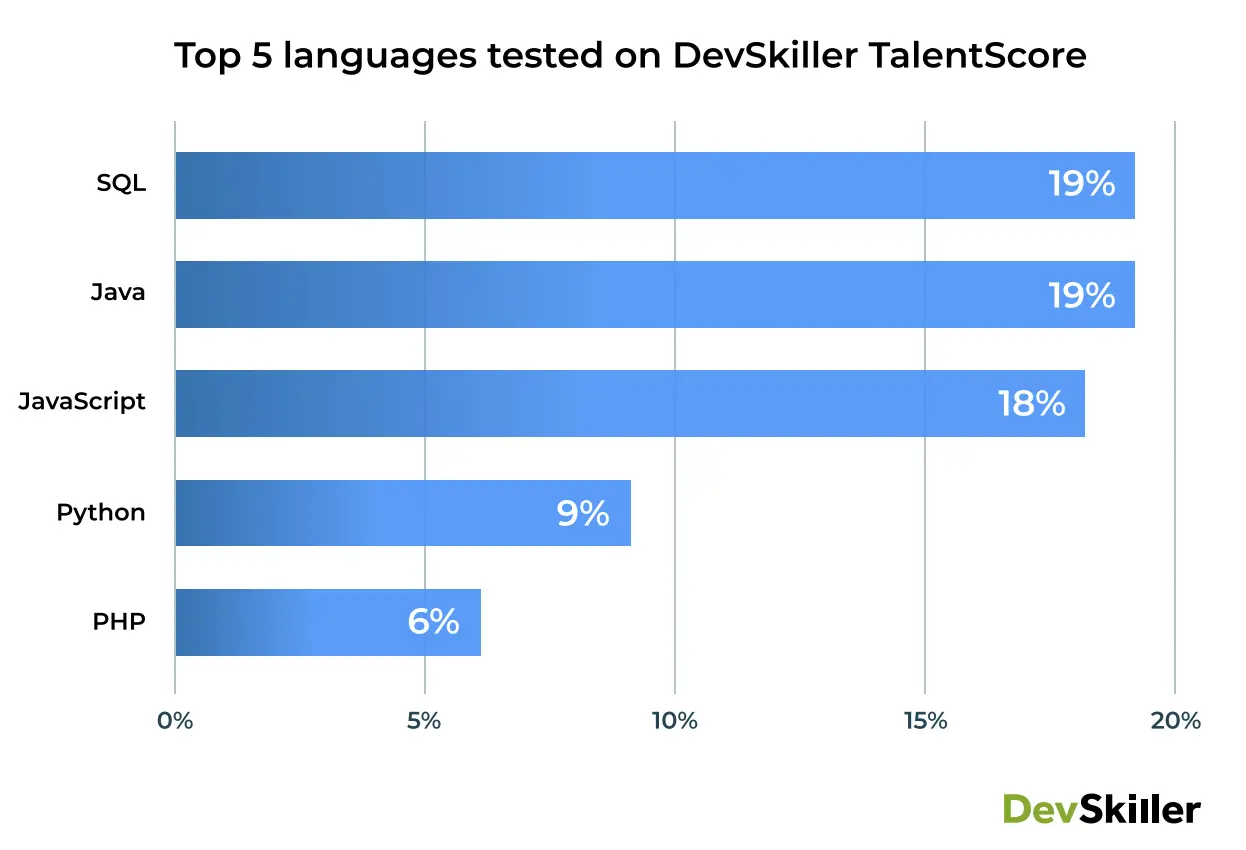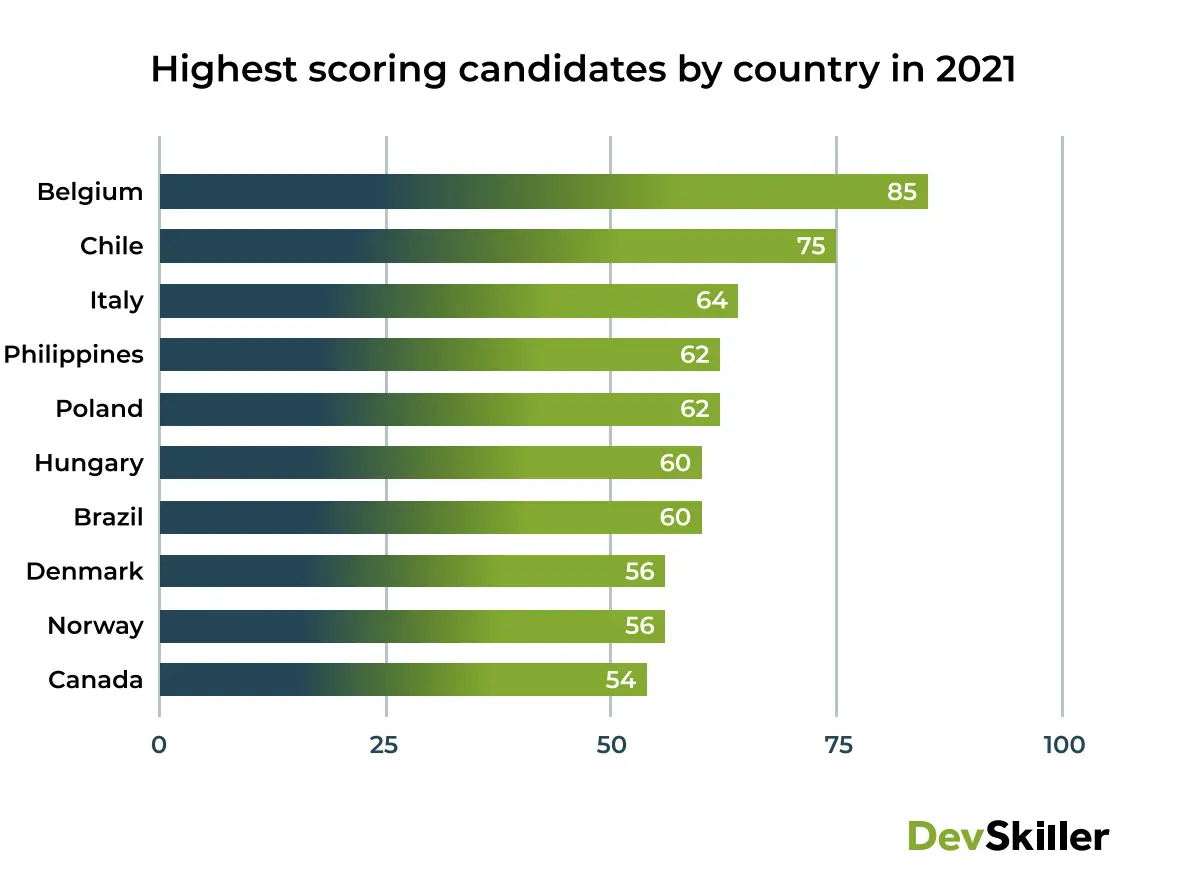In this post, we’ve partnered with DevSkiller to bring you the most in-demand web developer skills for 2025 and beyond. This is based on data from their IT Skills Report.
Unsurprisingly, web development is still a lucrative field in 2025. Companies continue to place great emphasis on hiring quality developers who understand the modern web stack. While the core set of skills for web developers has remained relatively stable, some older technologies are rising in popularity once again.
Whether you’re working as a developer or looking to transition into coding from another field, you’ll want to make sure your skillset is up to date. So what are the most in-demand web development skills for 2025? Here are the key trends and changes you should be aware of:
- JavaScript is still the most in-demand language
- Java is regaining popularity
- Data analysis is an increasingly relevant skill
- Coding tests are (even more) key to the hiring process
- Remote work is on the rise
- AI coding is hard to ignore
Let’s explore each of these trends in more detail now.
1. JavaScript retains its lead as one of the most in-demand languages
Decades after its invention, JavaScript has remained steady in its popularity. This versatile language continues to be highly desired among recruiters and companies alike, and experienced JS developers can expect a great salary.
The DevSkiller IT skills report offers some interesting insights into the situation. Overall, they recognized it as the most popular IT skill tested in the US, ahead of Java and .NET/C#.
After three years at the top, in 2022 JavaScript was a close third in the most popular IT skills that companies are testing candidates for. Rounding out the top 5 were Java, SQL, Python, and PHP.

Despite the fact that other languages have started to catch up—in particular Java—it doesn’t look like JavaScript’s popularity is about to dip anytime soon.
The language is still the default choice for new solutions in many organizations. It also enjoys strong community support, with lots of learning materials and opportunities to polish one’s IT skills. For those primarily concerned with the long-term prospects of their career, JavaScript remains a wise choice.
2. Java is regaining popularity
Java used to be highly popular several years ago, but its position in the charts had lost momentum recently.
2023 reversed that trend, and it’s set to continue. Java is now the second-most popular coding language in December 2023PyPl Index, according to the . Many recruiters and employers are now looking for experienced Java developers. Java is enjoying a lot of popularity in corporate environments in particular.
Previously, some saw Java as a language that mostly retained its relevance due to the need for supporting legacy systems, but new solutions have been arriving on the market recently. The language has received some exciting additions in 2022, with more good things for Java predicted for 2024.
At the same time, we’re seeing some new developments in its ecosystem, like the ability to run Java applications in a standalone format that does not require any standard Java libraries or a Java Virtual Machine. This is already starting to gain popularity in certain circles.
3. Data analysis is becoming a crucial skill
Big data is everywhere; in fact, you’ll struggle to find a sector or organization that isn’t driven by data to some extent.
While some understanding of data analysis was once viewed as a bonus addition to your core IT skills, it’s fast becoming a fundamental requirement in some fields. The increasing prevalence of machine learning has been a major driving force, with algorithms playing a crucial role in how companies build and improve their products and services.
Despite this, it’s important to recognize that data analytics is a career path in its own right. So, as a web developer, you don’t necessarily need to be well-versed in the underlying mathematical concepts; often, it’s enough to be able to use certain data analytics tools and frameworks.
The level of data analytics knowledge required depends on the field you’re working in. But, as data becomes increasingly important in all sectors of business, be prepared for this topic to come up in interviews.
4. Coding tests are becoming even more challenging
Coding tests are fast becoming the go-to screening method for web developer candidates. This sentiment is reflected by coders taking longer to prepare for coding challenges as well as interview questions and taking them more seriously overall.
Recruiters are now including more challenging programming tasks in response to this trend in candidate behavior. As a result, the expectations towards candidates taking coding tests are now higher than ever before.

Step forward Belgium, who may not have won the 2022 World Cup, but did win the highest score at coder tests in the DevSkiller IT Skills Report 2023.
Working under pressure during a coding test is crucial for obtaining a well-paid job, regardless of the language or framework that is being tested.
Companies that were not heavily focused on coding tests in the past have begun to utilize them more actively. Preparing for your technical interview will take much more time than the other rounds.
Performing well in a coding test requires an additional set of skills on top of your technical ones. It’s important to take some time to study the common patterns in these scenarios and know what to expect.
5. Companies are more open to remote work
Work-from-home arrangements have risen in popularity as a result of the Covid-19 pandemic.
Many companies have come to the realization that remote work could continue on a permanent basis without impacting overall productivity. This flexibility has allowed companies to broaden their talent pool beyond their own country’s borders. The market has been going through a major transformation in this regard, which has affected the presence of certain countries on the global job market hierarchy.
As reported in the DevSkiller report, the UK, Canada, Australia, Indonesia, Denmark, and Chile all saw increases in their international hiring percentage. Candidates who are willing to work remotely should definitely expand their search to include a variety of locations.
Remote workers receiving the same salary as their in-office counterparts was one of their big workplace hiring trends for last year, and shows no sign of slowing—remote and hybrid working tops 2023 workplace trends lists too.
You can learn more about how to forge a successful career as a remote web developer in our guide, and also to take a look at some of the best tech companies in 2025. Spoiler alert! They all have remote work policies.
6. Coding skills are hard to ignore
Incorporating AI into web development demands a combination of programming expertise and AI comprehension. Developers of all types should excel in AI concepts and libraries in 2025.
Beyond the basics, full-stack developers should delve into AI coding, encompassing machine learning algorithms, natural language processing (NLP), and computer vision concepts. Machine learning extracts insights from data, NLP enables natural language understanding and generation, and computer vision interprets and analyzes visual data.
Mastering AI coding skills opens up new possibilities for full-stack developers, enabling them to create more intelligent and interactive web applications.
And remember, AI won’t take developers’ jobs; it’ll allow you to build even more.
Final words
2022 was yet another transformative year for the tech industry, as many of the shockwaves from the previous two years bedded in, and a less certain forecast for tech was created by the energy crisis and cost-of-living crisis.
All-in-all, workers and companies are finding themselves a completely difference playing field. It will be interesting to see how these trends extend through 2025, and how the global IT workforce shapes up in years to come.
If you’re considering a career in IT or perhaps a change in your field of expertise, the 2022 DevSkiller IT skills report is stacked with valuable information on the technology industry.
And, if you’ve yet to try your hand at programming, why not give this free coding short course a go? You’ll build your first mobile-responsive website in just 5 tutorials using HTML, CSS, and JavaScript.
You may also enjoy these articles:
